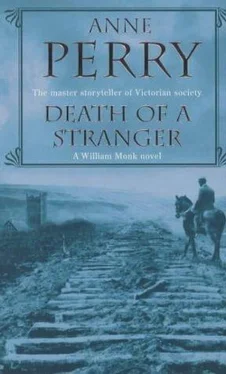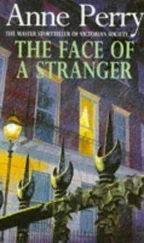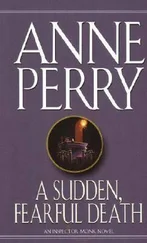“Certainly,” Hester said with considerable asperity. Then she remembered the role she had cast herself in and changed her attitude. “Certainly,” she repeated, with considerably more respect. “You are quite right. We shall conduct ourselves appropriately.”
“Right y’are.” He turned around and led the way through the door and along the passage to the ice room, where corpses were stored if required to be kept for any extended period.
“Why did you ask him to stay?” Hester said in an almost stifled whisper.
The attendant stopped and turned around. “Beg pardon?”
Hester felt herself flush hot. “I… I said it was nice of you to say you would stay,” she lied.
“Gotter,” he said grudgingly. “The cadavers ’ere are in my charge. Some people don’t think as it matters very much, but yer’d be surprised wot some folks get up ter wif bodies. There’s mad people around, an’ that’s a fact!” He snorted. “An’ people will steal bodies ter cut up, Gawd ’elp us!”
Margaret gulped, her face pale, but she kept her composure admirably. “All I wish to do is look at Uncle Nolan,” she said huskily. “I would be obliged if I might do so without hearing more of such… atrocities. I quite appreciate why your care… and… and diligence are necessary. I am grateful for them.”
“Jus’ doin’ me duty,” he said stiffly, and opened the next door, ushering them into a small, very cold room with bare, whitewashed walls. “You said Nolan Baltimore? Last one over there.” He walked across the damp stone floor to the fourth table, where a figure lay supine, covered by a large unbleached cotton sheet. The attendant looked at Margaret skeptically, as if to assess the likelihood of her fainting or otherwise making a nuisance of herself. He gave up the struggle and with a sigh of resignation pulled the sheet off the head and shoulders of the corpse.
Margaret made a little hissing sound of breath between her teeth, and swayed as if the floor beneath her were the deck of a ship.
Hester moved forward quickly and put her arms tightly around her, holding her hard enough to cause pain.
Margaret gave a little yelp, but the sharpness of Hester’s grip seemed to steady her.
They both looked down at the mottled gray-white flesh of the face. It was coarse-featured, with fleshy cheeks and jaw. The large eyes were now closed, but the sockets suggested their shape. His hair was receding, wavy, a dark gingery gold. He was obviously a large man, heavy-chested, thick-armed. It was difficult to judge his height, but probably close to six feet.
The hardest thing was to imagine life and color in the features, to think what they would have been like animated by intelligence. And yet presumably to have built a company like Baltimore and Sons he must have had skill, imagination and immense drive.
“Thank you,” Margaret whispered. “He… he looks so peaceful. How did he die?”
“We do our best,” the attendant said, as if she had passed him a compliment.
“How?” she repeated, her voice rasping in her throat.
“Dunno. P’lice say as ’e likely fell down stairs. Yer can’t see ’ere ’ow broke up ’e is inside. An’ o’ course we clean ’em up.”
“Thank you,” Margaret repeated, struggling to get her breath. The cold and the smell of carbolic were almost overcoming her.
Hester stared at the form on the table. She had seen so many dead men, although most of them not as neatly and clinically laid out as this one. But even without touching him or moving anything, she noticed a certain crookedness in the way he was positioned. Cleaned up or not, she guessed many of his bones had been broken or joints dislocated. It must have been a very hard fall. And staring at his head she noticed fine scratches on the neck stretching under the left ear down to the front of the throat, then starting up again on the front of the breastbone. Fingernails? They were scratches, not cuts, and the edges were new and raw, bloodless of course now, but the skin had a ragged look as if it had had no chance to heal.
“Yer seen enough?” the attendant asked, looking at Margaret and beginning to frown.
“Yes… yes, thank you,” Margaret replied. “I… I should like to leave now. I have done my duty. Poor Uncle Nolan. Thank you so much for your…” She tailed off, unable to keep her composure and finish.
Hester realized that Margaret was at the end of her strength. This was probably the first time she had seen a dead man, although one woman had died in the house in Coldbath, but that was different, full of emotion, pity, and in the end some kind of peace. This was simply freezing cold and smelling of stone and carbolic. And it was old death, days old.
She put her arm around Margaret’s shoulders and walked with her out into the passage again, crushing down her disappointment. At least she had a picture in her mind to try to put into words.
At the entrance they thanked the attendant again, then went as quickly as was even remotely decent out into the street and the gently falling rain.
“Tea!” Margaret gasped. “And somewhere to sit down, somewhere dry!”
“Wouldn’t you rather get back to Coldbath?” Hester said in concern. “I’m not sure what sort of a place around here would offer-”
“I want to draw him before I forget!” Margaret hissed at her. “I can’t do that standing up in the rain!”
Hester was taken completely aback. “Can you… I mean, could…”
“Of course I can! If I do it while he’s still sharp in my mind! Which right now I feel will be forever, but common sense and profound hope say it will not.” Margaret stared around and started to walk more briskly in an effort to reach just such a place, and Hester had to skip a couple of steps to catch up with her, and then seize her by the arm to stop her from bumping into a peddler who was hoping for a sale of bootlaces.
Eventually they found a tavern where they settled for a table in the corner, two half pints of cider and two hot pies. As soon as they were served, Margaret took out the paper and pencil and began to draw. Every now and then she sipped from her glass, but she ignored the pie. Perhaps the thought of eating while she saw the face of a dead man was too much for her.
Hester was suddenly profoundly hungry. In her case, relief outweighed more delicate feelings, and all she could think of was how clever Margaret was to bring character and life into a representation created out of lines on paper. In front of her, Nolan Baltimore’s face took shape until she felt as if she must have known him.
“That’s marvelous!” she said with deep respect, wiping her fingers on her handkerchief, then drinking the last of her cider. “If we show people that, they will certainly know whether they have seen him or not.”
Margaret looked up at her, her eyes bright with pleasure for the praise. “I had better do another,” she said gravely. “If we were to lose it we should be in difficulty.” And immediately she set about depicting Baltimore from a slightly different angle, more three-quarter face.
Hester fetched her another glass of cider, and one more for herself, and watched patiently while Margaret did a third drawing as well, in remarkable detail, and shaded to show an almost three-dimensional likeness.
Then, before they ran even greater risk of attracting anyone’s attention, they put the drawings away and left, going out into the damp streets, but with a clear sky above and a mild breeze promising to keep it so.
They had a very quiet afternoon at Coldbath. Hester deliberately took a short sleep in preparation for her plans, which might involve much of the night. She knew Monk would not be at home, and therefore needed no explanation as to why she was not either. She had no intention of taking Margaret with her. Margaret had already done magnificent work today.
Читать дальше












